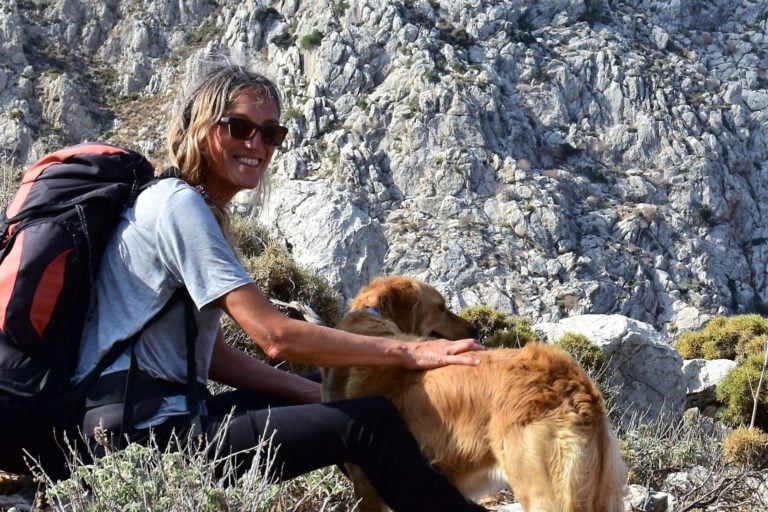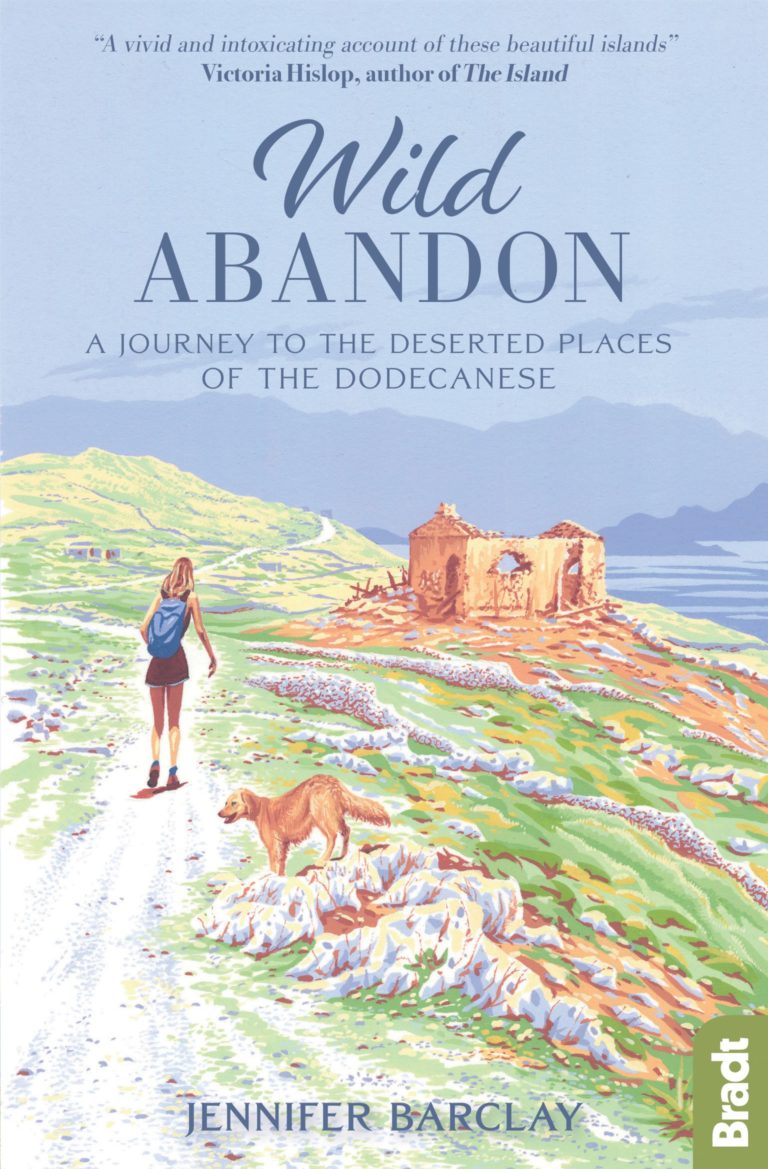Jennifer Barclay is basking in the autumn sunshine on Tilos trying to keep her kitten from trampling all over her herbs while I am sitting in the gloom of a cold Victorian evening wondering how nice it would be to trade places. Not that she would be that keen.
The much-travelled Ms Barclay has made the Dodecanese island of Tilos her home for the past 10 years and it has been a place of peace and inspiration.
The writer and editor spoke to Neos Kosmos about her latest book Wild Abandon: A Journey to the Deserted Places of the Dodecanese (published in May as an e-book and came out in book form on 1 September) is the third about her experiences and discoveries in the Dodecanese. The other two are: Falling in Honey and An Octopus in my Ouzo. She has also written about her travels in Korea in Meeting Mr Kim.
Ms Barclay is not your package tour sort of traveller. She prefers to uncover the stories of the places she visits for herself and not rely on guide books to do it for her and the reader gains from that approach. The stories that Wild Abandon uncovers are revealed through her walks around the islands with Lisa, her dog and companion.
“She makes me laugh and is easy to talk to. She likes walking as much as I do” laughs Ms Barclay when asked why travel the islands with a dog.
“She also would often change the journey taking me on paths I would not otherwise have taken and she was a good icebreaker and helped me to meet people.”
Many of the journeys for the book took place in the winter months as the summers are too hot and busy with tourism.
“People have more time talk (in winter). There were times when we would wild camp (with a tent) on beaches in remote places. Or we would stay in rooms, there was usually something open somewhere.
“People have been very accommodating and it is nice to stay in little hotels. I would get a feel of the people and the stories of those who stayed (on the islands) and the people who left.”
The germ of the idea to write the book that became Wild Abandon began on a visit to an abandoned village on Tilos as well as other abandoned places in the Dodacenese years before she finally settled there.
READ MORE: Author unveils the rich tapestry of the hidden world of the Dodecanese
“I only thought of it again standing by the volcano at Nisyros where a beautiful chapel was built with money from Australia and the US. That made me think of all the people who had left and I wanted to learn the history of abandonment over 100 years and I saw the islands through that lens.
“So many people here on Tilos seem to have relatives in Australia, though I don’t think the Tiliots are a huge community there, unlike say the people of Kastellorizo who number something like 30,000 in Victoria. That tiny island had a big population during the Turkish era, but suffered from one disaster after another over the last 150 years, and now has only about 250 permanent residents.
“I talk about a few Australian connections in that chapter, including a reference to Peter Michelides who built a tobacco business in Egypt and then in Western Australia. In 1912, the Castellorizian Association of Western Australia was established, the oldest ethnic organisation in Australia.”
“I also talk a bit about the Greek diaspora I encountered during my time in NSW, and reference a book I worked on by Maria Katsonis called The Good Greek Girl.”
It is no surprise to hear that Ms Barclay has spent a year in Australia where she looked after pets while their owners were away. Before settling in Tilos, she had worked for 10 years in publishing in Toronoto.
She returned to Europe, living first in Montpellier in France for two years and then back England where she lived in Chichester with lengthy stays in Guyana and South Korea during that time.
“I edit travel books for a living – over the years I have edited books on travel, adventure, bold living and living life to the full.
But she also likes the simple things.
“I am not a city person and grew up in a village. I enjoy the simple things. I wanted to live in a place where there were not too many cars or roads that was still rural and traditional,’ she said.
Growing up, Ms Barclay’s family travelled regularly to Greece on holiday. She was the only student in her school who studied Ancient Greek in her final year and had developed an affinity to the Eastern Mediterranean.
“When I returned to the UK, I headed to the Dodecanese. I loved the dry rocky landscape rather than the greener islands to the north. I took a week-long holiday in Tilos and returned a year later and tried to figure a way to work from home.
“Tilos is very welcoming to outsiders. It has a low population and so they are more accepting of people from other countries. There are people from two dozen countries living here – English, Russians, Ukranians, Bulgarians and Albanians living full time. My neighbours are Greeks and Swedes.
Many are retired people from Northern Europe.
“It took time for people to understand that I was not wealthy or retired. It is hard to explain to people that I write books and that I edit other people’s books.
It helped that she had a grounding in the language but she also determined from the beginning to take part in life of the community by helping the local children with their English in the winter and helping in a beach cantina in the summer.
“It also helped me to get to know the people.
“The fact that I speak the language and live here the year around, helps me to understand the difficulties as a well as the benefits of living here. People see you making the effort to live here – not that it is such a great effort.
Despite the fact that the islands are close, they have unique histories and stories to uncover. There are so many different histories and so many diverse stories even though the islands are so close to each other.

On the larger islands of the group, Kos and Rhodes there are buildings that hark back to the Italian presence on the island. Some of the older residents can still speak Italian in the smaller islands.
“On the bigger islands there were secret schools where students studied Greek history and language” she said.
“One of the weirdest abandoned places is Eleousa or Campochiaro (Italian name), a purpose-built Italian village that served as a retreat for Italian army and government officials.
“There is a villa there that was for (Italian fascist dictator) Benito Mussolini’s retirement. Close to the villa is a hotel built in the Austro-Hungarian style that once served Italian officers.
A building close to the fascist headquarters was to later converted into a Tuberculosis Hospital.
“It is a grim, scary place but with a beautiful history as the Greek doctor there developed an TB outreach program for the community,” said Ms Barclay. There are plans to develop the site for tourism.
On Nisyros, the island’s volcanic geo-thermal springs and the site of spas built under Turkish rule by Hippocrates Pantelidis.
“The bath houses were very iconic and were famous all over the Mediterranean for the cures they offered. Many of the buildings are now abandoned. I have met a lovely Greek Australian who returned to the spa every few years,” she said.
This year, thanks to COVID-19, tourism to the Dodecanese took a strange turn.
“At the beginning of summer, it was very quiet and then suddenly Greek tourists flooded in because everyone was desperate to get out of the big cities. On Eristos beach (on Tilos island), we had the biggest influx of campers ever. The tavernas did well and the free campers were very good with the litter. They were very environmentally conscious. This year recycling was introduced for the first time and this has brought plastic waste under control.
“A lot of Italians also came. People have been very careful with many precautions being observed against COVID-19 on the ferries and shops. The summer has not been as bad for visitors as we feared in June. Rhodes, which relies on mass tourism and cruise ships may have suffered more than the smaller islands.
“What is missing are the festivals – so there is no arm-in-arm dancing. People from Rhodes traditionally come to Tilos on the feast of Agios Pandelimonos on 27 July as well as on the Feasts of the Dormition and Assumption in August.”
♦ Wild Abandon: A Journey to the Deserted Places of the Dodecanese by Jennifer Barclay is published by Bradt Guides (ISBN 9781784775919 ) and is available in Australia through Dymocks; Readings , at Avenue Bookstore in Melbourne and Abbeys in Sydney.










